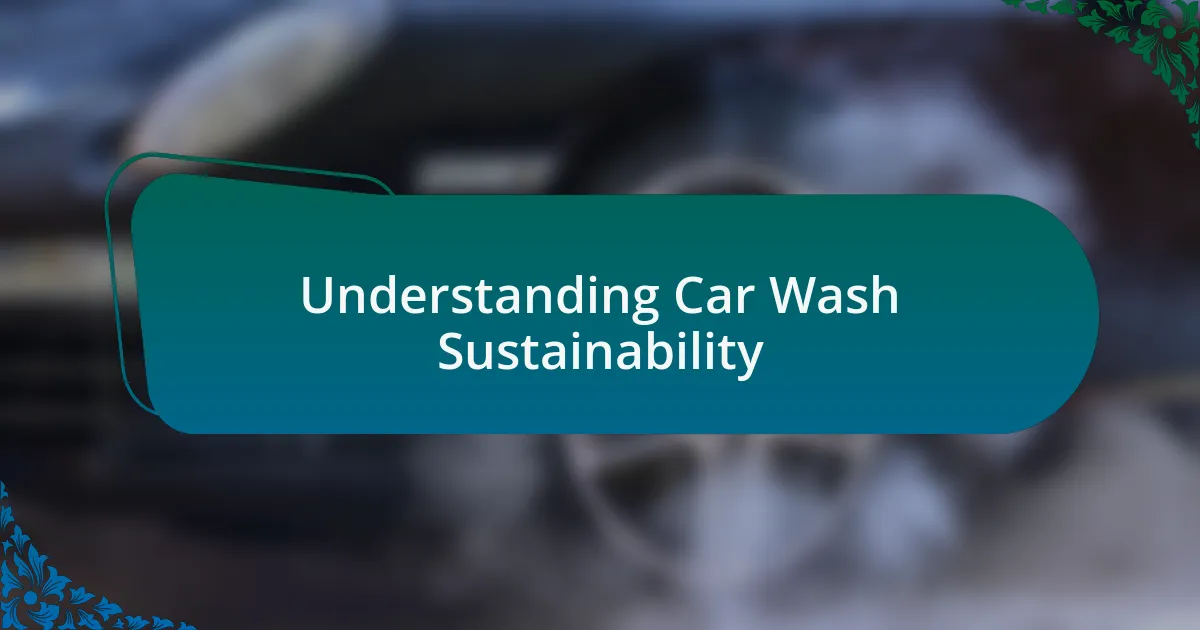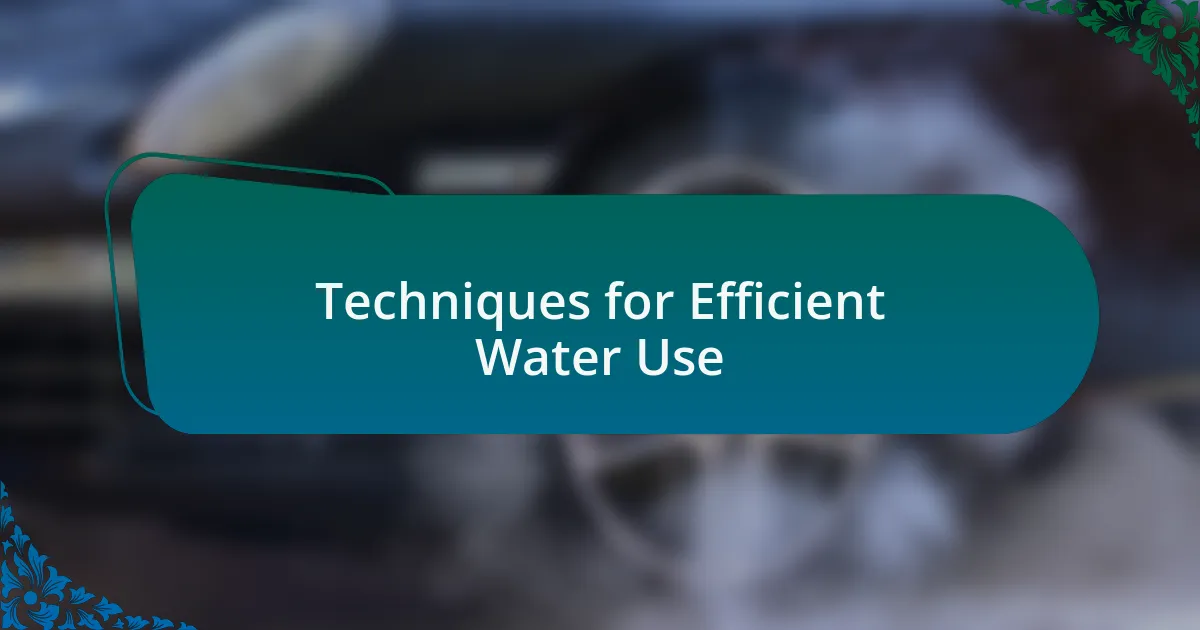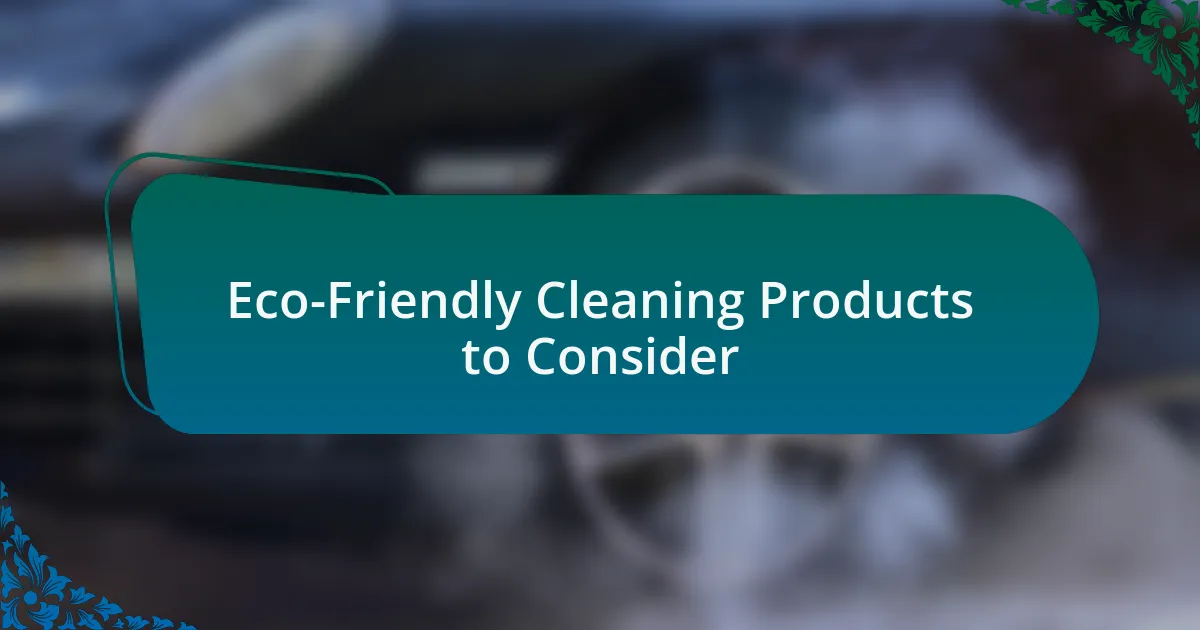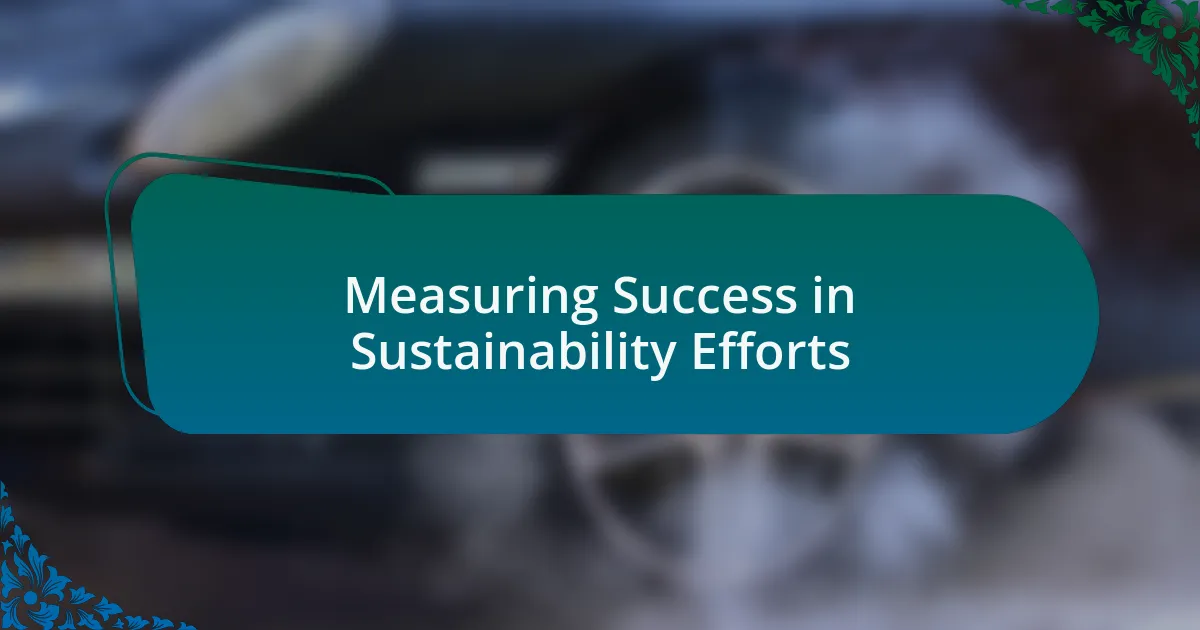Key takeaways:
- Sustainability in car washing reduces environmental impact, emphasizing water reclamation systems and eco-friendly products.
- Adopting renewable energy, like solar panels, can cut costs and enhance a car wash’s appeal to environmentally conscious customers.
- Efficient water use techniques, such as high-pressure, low-flow nozzles, and employee training foster a culture of sustainability.
- Measuring success through KPIs, customer feedback, and audits helps track progress and identify areas for improvement in sustainability efforts.

Understanding Car Wash Sustainability
Sustainability in car washing isn’t just a trendy buzzword; it’s a vital component of the industry moving forward. I recall a time when I was blissfully unaware of the environmental impact of water usage and chemical runoff. Have you ever thought about how much water is wasted during a typical wash? That realization hit me when I started exploring the eco-friendly alternatives available today.
Every drop counts, and implementing water reclamation systems can drastically reduce waste. I remember visiting a car wash that showcased their setup, and it was impressive to see how recycled water was used repeatedly. It made me wonder, why isn’t every car wash adopting this technology?
Eco-friendly products can seem like an extra cost initially, but they contribute to a longer-term vision. I’ve seen firsthand how using biodegradable soaps not only benefits the planet but also resonates with customers who are increasingly conscious of their choices. It’s fascinating to witness how these sustainable practices forge a deeper connection between businesses and their clientele, nurturing loyalty while promoting a healthier environment.

Importance of Sustainable Practices
Sustainable practices in the car wash industry play a crucial role in protecting our environment. I remember when I learned that traditional car washes could use up to 100 gallons of water per vehicle, which really struck a chord with me. Imagine if we could transform that reality and drastically cut down on water usage—what a difference it would make!
One memorable experience was when I attended an industry conference focused on sustainability. I was inspired by a speaker who shared how using solar panels not only powered their car wash but also reduced energy costs significantly. It raised a familiar question in my mind: why are we not all capitalizing on renewable energy sources? The potential for both financial savings and environmental impact is undeniable.
Moreover, customers are increasingly motivated by environmental responsibility. I’ve seen firsthand how a car wash that prioritizes sustainability attracted new clients simply by showcasing their green initiatives. When I walked through a facility proudly displaying its eco-friendly certifications, I felt a sense of pride; I was supporting a business that aligned with my values. Isn’t it encouraging to think that sustainable practices can lead not only to a healthier planet but also to a thriving business?

Techniques for Efficient Water Use
When considering efficient water use in car washes, I’ve found that adopting water reclamation systems can be a game changer. These systems collect and filter used water so it can be reused for future washes, which not only minimizes waste but also reminds me of how small changes can lead to significant savings over time. Have you ever thought about how much water could be conserved with such simple innovations?
Another technique I’ve found effective is using high-pressure, low-flow nozzles. When I first witnessed this in action, I was amazed at how a powerful jet of water could use so little of it. This not only gets the job done quickly but also leaves customers satisfied—who doesn’t love a vehicle that looks immaculate while knowing they’re making an eco-friendly choice?
Incorporating water-efficient practices isn’t just about technology; it’s also about employee training. I’ve seen firsthand how empowering staff with knowledge about efficient techniques cultivates a culture of sustainability. When team members understand the importance of their actions, they’re more likely to take pride in conserving water, creating a ripple effect that can inspire customers as well. Don’t you think that fostering a sense of shared responsibility can amplify the impact of individual efforts?

Eco-Friendly Cleaning Products to Consider
Eco-Friendly Cleaning Products to Consider
When I switched to plant-based cleaners, the difference was remarkable. The fresh scent fills the air without the harsh chemical sting, and I couldn’t help but wonder why I hadn’t made this change sooner. Have you ever noticed how more natural products often leave surfaces spotless without the guilt of toxic residues?
Another eco-friendly option I’ve embraced is biodegradable soaps. Initially, I was skeptical about their effectiveness compared to conventional products. However, after trying them out, I realized they clean just as well while breaking down safely in the environment. It’s astonishing to think that we can achieve impeccable results while being kind to our planet; is that not a win-win situation?
I also highly recommend citrus-based cleaners for their powerful grease-cutting abilities. I recall a particularly stubborn spot on my car’s dashboard that seemed impossible to remove. The citrus cleaner tackled it effortlessly and left a refreshing scent behind, proving that these solutions can be just as effective as traditional ones. Isn’t it encouraging to find products that make cleaning easier while also caring for the environment?

Measuring Success in Sustainability Efforts
To truly gauge the impact of sustainable practices in a car wash, I believe tracking key performance indicators (KPIs) is essential. For instance, measuring the reduction in water usage or comparing costs of eco-friendly products versus traditional ones provides tangible insights into our efforts. Have you ever stopped to think about how these metrics can paint a clearer picture of our progress?
I often find that customer feedback is a goldmine when assessing the effectiveness of sustainability initiatives. After implementing biodegradable soaps, I received numerous compliments from clients who noticed not just the cleanliness, but the pleasant, fresh atmosphere of our facility. Isn’t it fascinating how their experiences can serve as a barometer for what we’re doing right?
Lastly, audits and reviews are invaluable tools in this journey. By systematically analyzing the operational processes, I can identify areas for improvement and celebrate successes. I remember the satisfaction I felt after documenting a significant drop in waste—a small triumph in our ongoing commitment to a greener future. Isn’t it empowering to recognize that every step, no matter how small, contributes to a more sustainable approach?